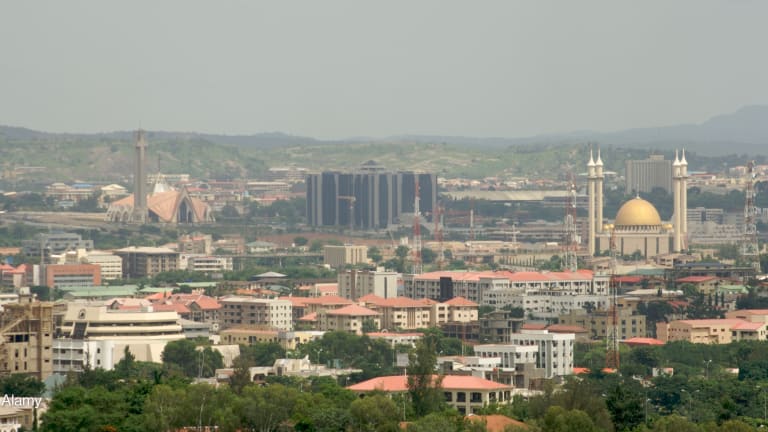
ABUJA, Nigeria — Over the next two decades, Nigeria is expected to become ineligible for a range of external health financing sources, from Global Fund grants to World Bank financing, due to the country's improving economic performance and the timelines of funds that are due to expire. Already, funding from the Global Polio Eradication Initiative is set to drop by 40 percent in 2019. Earlier this year, Gavi, the Vaccine Alliance agreed to an extension on vaccination funding, but only until 2028.
“The health sector has suffered from chronic underfunding for many years now. We are even behind South Sudan, Angola, and Ethiopia.”
— Isaac Adewole, Nigeria's health ministerDespite this, many of Nigeria’s key health interventions — including on polio eradication, vaccination programs, malaria, tuberculosis, HIV/AIDS, and maternal and child health — remain almost entirely dependent on foreign donors, with the government committing just $5 per citizen to health under its current budget.
As donor money starts to shift away, and the clock runs out to establish a locally backed replacement, patients are already feeling the impact.
When the money runs out
When the primary health center at Monatan, a small suburban community in Oyo State, southwest Nigeria, ran out of free anti-malarial drugs in late October 2018, some patients managed to purchase them at a nearby pharmacy. But Emily Adebayo, 73, could not raise 3500 Nigerian naira ($9.60) to buy the drugs for her 8-year-old grandson, Abiodun, who had developed fever five days earlier. Three weeks before, Abiodun would have received a complete dose for free.
The hospital management board told Devex the donors supplying the medication to hundreds of health facilities across the state were yet to replenish the stock. But service providers said that most of the patients who visit free health centers cannot afford to buy the drugs themselves. In the meantime, they will use “herbs, concoctions, and prayers,” a community health worker at the Monatan center said.
Hospitals in the U.K. and U.S. are filling up with Nigerian doctors, as its own hospitals empty.
Malaria treatment is just one health service that hospitals and health centers across Nigeria rely on. HIV, tuberculosis, and family planning services would also be largely impossible without the support of donors such as the U.N. Children's Fund, U.N. Population Fund, and U.S. Agency for International Development.
Advocates told Devex the health sector is so heavily reliant on foreign funding because the government has failed to make it a top priority. Nnamdi Agha, director of finance at the Planned Parenthood Federation of Nigeria, argued that if the government can finance its defense budget without foreign support, it could do the same for health — even if that meant borrowing money as it does for other sectors.
The reliance on foreign donors causes problems. Biodun Awosusi, a physician and health economist, argued that the priorities of foreign donors can be unpredictable and do not always align with the receiving country's national policies and plans. Agha added that the situation means most funds are spent outside the country: “For instance, the Global Fund provides a lot of money for [the] purchase of drugs but none is made by any Nigerian company and none is encouraged to manufacture those drugs.”
But the biggest problem for Nigeria is that foreign funding is now starting to run dry, as it heads toward a transition away from multilateral development assistance.
Closing the gap
In 2001, member countries of the African Union met in Nigeria's capital to produce the Abuja Declaration. Under this, they pledged to commit at least 15 percent of their annual budgets to improve their countries’ health sectors. But since then, Nigeria has repeatedly and significantly fallen short of the commitment it helped to create. The most it has spent on health in the years since was nearly 6 percent of the budget in 2012. In 2018, it was nearly 4 percent.
The issue has long been a concern for the country's health minister, Isaac Adewole. Back in 2016, he pointed out that Nigeria had one of the lowest health budgets in Africa, spending less on health than some conflict-affected countries. “The health sector has suffered from chronic underfunding for many years now. We are even behind South Sudan, Angola, and Ethiopia. We cannot develop the sector if we do not give it the funding that it deserves,” Adewole said.
In August this year, Nigeria officially launched the Basic Health Care Provision Fund, which is guaranteed to be financed by 1 percent of the budget under the National Health Act. But while the fund was presented by the government as a major feat and praised by local media, it has only raised health spending to 4.9 percent — not even a third of the Abuja commitment.
Beyond this, the Nigerian health ministry has been vague on its plan to significantly improve spending. Its leaders have been vocal about their intent to do so, but the minister's office could not offer any documentation to show if and how this would happen.
Health economists told Devex that Nigeria has no choice but to start spending more on health as it transitions off sources of external financing. Awosusi said it could look to its low-income neighbors for a model.
“In Rwanda, there is a nationwide compulsory health insurance scheme. Ethiopia has an innovative health extension program, which makes primary health care services available in rural areas. We can learn from them to spend adequately on health at [our] current income status,” he said.
More on health in Nigeria:
► Nonprofits take on Nigeria’s struggles with mental health
► Meet the women providing maternity care amid conflict
► Pregnant women in Nigeria are shunning medical centers. Here's why.
John Idoko, former director-general of Nigeria's National Agency for the Control of AIDS, said federal, state, and local governments all need to spend more on health: "We need domestic resources from government at all levels, involvement of the private sector and most importantly national, state, and community health insurance schemes.”
But Nigeria’s budget faces multiple pressures, including from education, to provide for a large youth population; and for its battle against Boko Haram in the north, which has cost billions.
Awosusi acknowledged the challenge but argued the government needs to spend at least $86 per capita on health — compared to the current $5 — and then use it carefully with minimum waste. He suggested exploring innovative ways to improve efficiency within the health system, leveraging emerging technologies.
Speaking at the Nigerian Human Capital Event in Abuja last year, Bill Gates agreed. His foundation has committed over $1.6 billion to Nigeria so far, he said, but “without more and better spent domestic money, investment in your people will decline by default as donor money shrinks — a lose-lose scenario for everyone,” he told top government officials, adding that investment in health and education will pay off in gross domestic product.
Speaking to Devex, Paulin Basinga, the Gates Foundation’s country director, was adamant that Nigeria can self-finance its health sector, but that it would require proper planning and increased government revenues. The country’s tax revenue to GDP ratio is currently one of the lowest in the world, at 6 percent. If that were raised, he said, it could generate enough to finance the health sector and end the country’s reliance on foreign donors, including Gates. “With a very good plan, over the next couple of years, Nigeria can do it,” he said.








